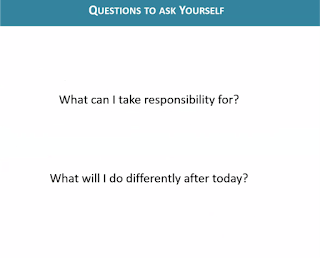‘The Power To Change’ by Campbell Macpherson; an interesting talk on embracing change in the world of uncertainty. Was a pilot in Australia and a bad one at it, so he say. The only thing was change. And then worked for Insurance as HR - had 14 different careers in 30 to 40 years. His Bio reads:
"Campbell Macpherson is an international business advisor, keynote speaker, Executive Fellow of Henley Business School and award-winning author. His first book, ‘The Change Catalyst’ (Wiley 2017)is about leading change and was the UK's 2018 Business Book of the Year’. His second ‘The Power to Change’ (how to embrace change and make it work for you) has recently been published by Kogan Page. Campbell runs workshops and webinars worldwide for leaders on 'leading change' and on 'embracing change' based on the content of his books. Campbell has been leading strategic change and enabling strategic change for more than 25 years; enabling organisations across UK, Europe, US, Asia, Australia & the Middle East to clarify their strategy, build cultures that embrace change and align their people to deliver – as CEO, Strategy Director, HR Director, Marketing Director, eBusiness Director, board member, change leader, business adviser and NED. He was a multimedia entrepreneur and started his career flying jets (badly) in the Air Force." It was amazing listening to him speak.
PART I
Change is inevitable, but successful change isn't.
'Change happens' as Forrest Gump should have said.
Those of us who can cope with change will survive.
Those of us who are able to embrace change and look for the opportunities will thrive.
And the power to change lies within each single one of us.
Things are not as bad as they appear and things are also not as good as they appear. The key topics covered where:
1. Our learning during last 12 months
2. 5 Key truths about change
3. The secret to successful change
4. How to react to change
5. Overcoming our personal barriers to change
6. Be your own leader of change
1. Our learning during last 12 months:
- Some change we can do nothing about - we have no choice but to accept it.
- We can cope with big, sudden change - if we have a strong emotional reason for doing so
- Everyone's response to change is different.
- Our response to change will differ depending upon the circumstances.
- The importance of genuine hope/confidence in the outcomes
- The importance of trust
- Mental health matters
Work from home tips:
- Work from home requires a routine.
- Set yourself goals,
- Think outcomes.
- Take breaks with time limit
- Actively reach out to others to help them and you
- Eat well
- Exercise
- Get outdoors
- Hide your phone
- Look for positives
- Be kind to yourself
2. 5 Key truths about change
- Change is inevitable
- All change is personal
- We all erect our own personal barrier to change
- All change is emotional - and emotions are normal
- We only change if we want to
Leadership is about helping people to want to change, we can be our own leader of change.
We have to help ourselves to change. Emotions is 4 times more powerful, when it comes to change.
We are very adaptable (when there is no other choice)
3. The secret to successful change
Have clarity of what you are trying to achieve - and why. Clarify the business outcomes and never lose sight of them. "If you don't know where you are going, you'll end up someplace else" - Yogi Berra.
Remember:
Ensure implications are fully understood. " There are downsides to everything; there are unintended consequences to everything" - Steve Jobs.
Understand implication of every change. Tell - It's okay. Have genuine communications and engagements.
5. Overcoming our personal barriers to change
- Encouraged to question the status quo?
- Continually looking to improve the way things are done - and enhance the customer experience they deliver?
- Open to new ways of working?
- Encourage to learn from failure?
- Is their behavior aligned to deliver the strategy?
- Is yours?
- Admitting denial
- Observing our emotions
- Detaching from negative thoughts
- Confronting our fears
- Reframing our identity and status
- Voicing our doubts and concerns
Fear of FailureFear of rejection or humiliationFear of the UnknownFear of blame
- Remain hopeful
- Make connections
- Choose how you react
- Accept that change is a part of life
- Keep things in perspective
- Forward momentum in small steps
- Take decisive actions
- Make every day meaningful
- Learn from experience
- Look for opportunities for self-discovery
- Nurture a positive view of yourself.
- Take care of yourself
- Be proactive














No comments:
Post a Comment